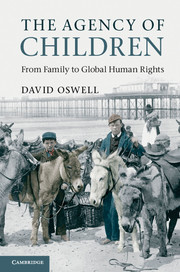Book contents
- Frontmatter
- Contents
- Figures
- Acknowledgements
- Part I Introduction
- Part II Social theories of children and childhood
- Part III
- 6 Family and household
- 7 School and education
- 8 Crime and criminality
- 9 Health and medicine
- 10 Play and consumer culture
- 11 Political economies of labour
- 12 Rights and political participation
- Part IV Conclusions
- Bibliography
- Index
11 - Political economies of labour
Published online by Cambridge University Press: 05 April 2013
- Frontmatter
- Contents
- Figures
- Acknowledgements
- Part I Introduction
- Part II Social theories of children and childhood
- Part III
- 6 Family and household
- 7 School and education
- 8 Crime and criminality
- 9 Health and medicine
- 10 Play and consumer culture
- 11 Political economies of labour
- 12 Rights and political participation
- Part IV Conclusions
- Bibliography
- Index
Summary
Viviana Zelizer eloquently described a shift in the value of the child from a subject that labours and contributes to the domestic economy to one that is ‘economically “worthless”, but emotionally “priceless”’ (Zelizer, 1994: x). Zelizer’s argument, which we will consider in more detail later in this chapter, provided an explanation of how children from the 1870s to the 1930s in the USA came to be taken out of paid employment and moved into classrooms and playgrounds, and showed how the correlative of this was an investment in children by adults as emotional centres of family and social life. In 2002 she provided a reconsideration of her original argument and suggested that if we look to children’s experiences of economic relations, and not simply at adults’ perspectives on children, then we are able to see how children are in fact ‘active economic agents’ in processes of consumption, distribution and production (Zelizer, 2002: 377). Zelizer’s reinterpretation of her earlier work is significant inasmuch as it picks up on a broader range of studies, interest and reinterpretation of children’s work and their relation to the economic that some writers see as emerging in the mid 1980s (Abernethie, 1998). In this chapter we will consider children’s labour in the context of industrialisation and will look at the framing of arguments against children’s labour in the late nineteenth century. We will then consider contemporary arguments about children’s labour in the context of broad shifts in socioeconomic organisation and discursive realignments around children’s human rights. Of importance is the construction and valuation of children’s labour in a global context.
- Type
- Chapter
- Information
- The Agency of ChildrenFrom Family to Global Human Rights, pp. 215 - 233Publisher: Cambridge University PressPrint publication year: 2012



